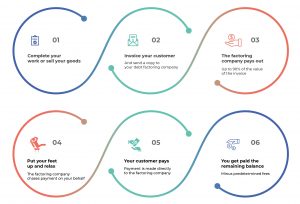
The nature of business-to-business transactions often involves extended credit terms, leading to delayed payments and potential liquidity constraints.
Debt factoring offers a pragmatic solution by converting outstanding accounts receivable into immediate working capital.
This allows B2B enterprises to bridge gaps in cash flow, promptly meet operational expenses, and seize growth opportunities without the burden of extended payment cycles.
What is debt factoring?
Debt factoring is is a finance facility for companies, it allows unpaid invoices to be used as collateral for a loan. The business will be given up to 90% of the invoice value almost immediately from the point of raising the invoice, therefore reducing the cash deficit for the small business.
Debt factoring is proven to help businesses grow and prosper and is an excellent alternative to a bank overdraft.
A quick definition of debt factoring is when a business selling their invoices to a third party at a discounted price in order to bypass the hefty waiting times which are associated with invoice payments.
It has become especially popular with SMEs due to its ability to provide them with instant access to capital and speed up their processes.
How does debt factoring work?

- The Business could be any type of company that sells goods or services, the company does need to trade with their customers on credit terms.
- The client is the entity, this also needs to be another business who bought the product or receives the service and is responsible for making the payment for goods or services.
- The debt factoring company is the party who buys the original invoice from the business and collects the payment from the client when the invoice is due.
- Within 24 hours the debt factoring company will pay the business a percentage of the invoice value due by your debtor.
Once the debt factoring company collects the full payment from the client, it releases the remaining percentage of the original invoice amount due by the client, minus a factoring fee.
Debt factoring advantages and disadvantages
There are a number of advantages and disadvantage to debt factoring, we have lists a few below:
Advantages:
- Overcoming short-term cash flow problems: If late invoice payments are causing you financial problems, this can be a quick and affordable solution. You’ll have the majority of the money owed to you in your account in time to make all your payments. This can help you avoid paying your own suppliers late and damaging your financial standing.
- Reducing stress: Late payments of invoices can be immensely stressful for business owners. As such, this can be great for your own peace of mind and help you to sleep more comfortably at night.
- No impact on your credit score: Unlike a loan this will not have an impact on your financial footprint. That’s because this is an advance on money which is already owed to you.
- Bad Credit? No problem: If you have bad credit, securing a loan can be more difficult, but a debt factoring company will not take as much notice of your personal financial history. Although they will take it into account when setting their fees, it is not your credit rating they are worried about as much as the chances of your invoices being paid.
- Reduced admin: As part of the service, they assume responsibility for chasing the invoices. This reduces the administrative burden on you and your team and frees you up for other things.
Disadvantages:
- Costs: Debt factoring comes with fees and charges, including discount fees and service charges, which can be higher compared to other financing options.
- Impact on Profit Margins: The discount applied to the accounts receivable can eat into profit margins, affecting the overall profitability of the business.
- Client Relationships: When a third-party factor is involved, the direct relationship between the business and its clients may be affected. Some clients might view the use of a factor as a sign of financial instability.
- Selective Approval: Factors may choose to approve only certain invoices, leaving some accounts receivable untouched. This selective approval can limit the benefits a business can derive from debt factoring.
- Long-Term Costs: While debt factoring provides immediate cash flow, the long-term costs can accumulate. If a business consistently relies on factoring, the cumulative fees can surpass the costs of other financing methods over time.
- Loss of Control: The factor assumes responsibility for collections, potentially leading to a loss of control over the customer payment relationship. This can impact customer communication and satisfaction.
It’s important for businesses to carefully weigh these disadvantages against the benefits when considering debt factoring as a financing option.
Is debt factoring right for my business?
Determining whether debt factoring is right for your business involves a thorough evaluation of your financial situation, operational needs, and long-term goals. Consider factors such as your cash flow requirements, the impact of potential fees on profit margins, and the nature of your client relationships.
If your business struggles with late payments or needs immediate access to working capital, debt factoring can offer a valuable solution. It’s crucial to weigh the benefits against the disadvantages, such as costs and potential strain on client relationships. Assess your business’s reliance on consistent cash flow, the volume of accounts receivable, and your comfort level with relinquishing control over collections.
For businesses facing short-term cash flow challenges, debt factoring can be a timely and effective solution, but for those with robust financial structures or long-term financing needs, alternative options may be more suitable.
Conduct a comprehensive analysis, possibly with the guidance of financial professionals, to determine if debt factoring aligns with your specific business circumstances and objectives.
Alternatives to debt factoring
Businesses exploring alternatives to debt factoring have a range of options to consider that can provide the necessary funding without resorting to selling accounts receivable.
Small business loans present a traditional yet reliable avenue for securing capital. These loans, typically offered by banks or alternative lenders, allow businesses to borrow a fixed amount and repay it over time with interest. Equity finance is another alternative where businesses raise funds by selling a stake in the company.
While this dilutes ownership, it doesn’t involve incurring debt, making it an attractive option for those averse to borrowing. Business grants, often provided by government bodies or private organizations, offer a non-repayable source of funds. Although competitive and often tied to specific criteria, grants can be a boon for businesses aiming to fund specific projects or initiatives without taking on debt.
Several examples of alternatives to debt factoring include:
- Small Business Loans: Securing a loan from a bank or an alternative lender allows businesses to access a lump sum of capital, which is repaid over an agreed-upon period with interest.
- Equity Finance: Seeking investment from venture capitalists, angel investors, or through crowdfunding platforms allows businesses to raise funds by selling a portion of the company’s ownership, avoiding the need for debt.
- Business Grants: Governments, non-profit organizations, and private entities often offer grants to businesses for specific purposes, such as research and development, expansion, or sustainability initiatives.
- Invoice Financing: Similar to debt factoring, invoice financing allows businesses to borrow money against outstanding invoices, providing quick access to cash without selling the invoices outright.
- Trade Credit: Negotiating extended payment terms with suppliers or utilizing trade credit agreements can effectively improve cash flow without the need for external financing.
Careful consideration of these alternatives in alignment with your business’s financial goals and structure can help identify the most suitable funding option for your specific needs.
F.A.Q’s
What is Debt Factoring in Business
Debt Factoring in business involves a seller which is usually the business, to sell their invoices to a third party usually a factor at a discounted price. By doing this it allows the business not to wait the term time of 30, 60, or 90 days to be paid. Business use this type of debt factoring in order to maintain a positive cash flow.
Debt Factoring Agreement
A Debt Factoring Agreement involves the sale of an unpaid invoice by a business to a 3rd party finance/factoring company. Businesses use Debt Factoring in order to receive up to 90% of the invoice's value in advance of the payment from the customer without waiting the full term.
Conclusion
In conclusion, debt factoring emerges as a powerful financial tool for businesses seeking to optimize cash flow, enhance working capital, and mitigate credit risks. By selling their accounts receivable to a third-party factoring company, businesses can swiftly convert outstanding invoices into immediate cash, thus circumventing the typical wait for payment from customers.
Debt factoring offers a range of benefits, including improved liquidity, reduced administrative burden, and greater flexibility in managing financial obligations. Moreover, it can serve as a lifeline for businesses facing cash flow constraints, enabling them to meet operational expenses, invest in growth opportunities, and maintain financial stability.
However, while debt factoring can be advantageous, it is essential for businesses to carefully assess the terms and fees associated with different factoring arrangements to ensure it aligns with their specific needs and financial objectives.
With prudent planning and diligent consideration of the potential impact on the business’s relationships with customers and partners, debt factoring can be a valuable tool in fostering growth and sustainability for businesses of all sizes.
Seasoned professional with a strong passion for the world of business finance. With over twenty years of dedicated experience in the field, my journey into the world of business finance began with a relentless curiosity for understanding the intricate workings of financial systems.
